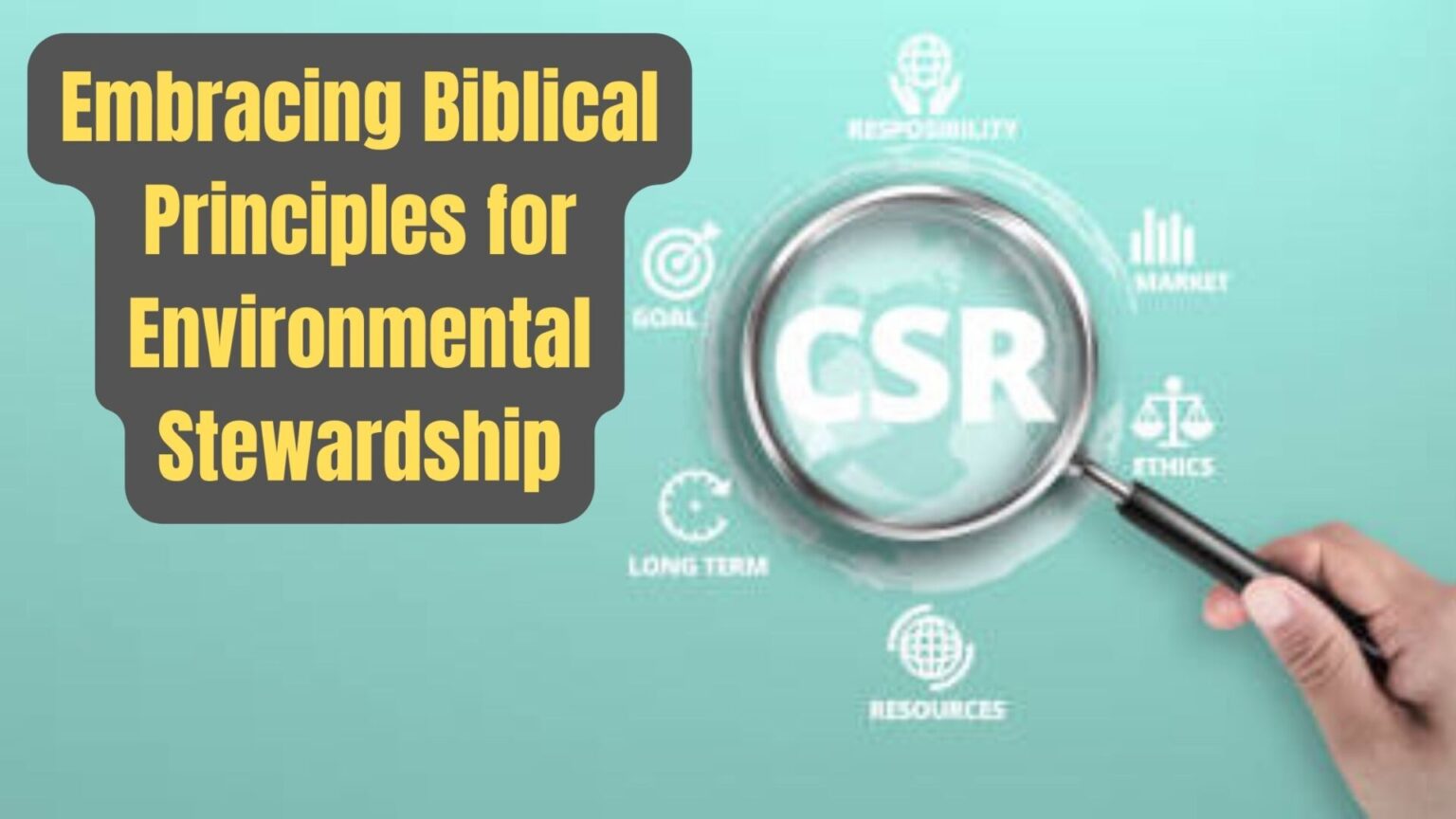Introduction:
Walking Humbly: Embracing Biblical Principles for Environmental Stewardship

In a world marked by climate change and ecological challenges, the call for environmental stewardship resonates louder than ever. As stewards of God’s creation, it’s imperative to reflect on biblical principles that guide our relationship with the environment. This article delves into the concept of “Walking Humbly” and explores how it aligns with environmental stewardship according to the Bible.
What are the key biblical principles for environmental stewardship?
Several key biblical principles inform the concept of environmental stewardship:
- Creation Care: The Bible teaches that God created the Earth and entrusted humanity with stewardship over it. This implies responsibility to care for and protect the environment (Genesis 1:26-31).
- Stewardship: Humans are seen as stewards or caretakers of the Earth, not owners. This entails managing resources responsibly and ensuring their sustainable use for future generations (Genesis 2:15).
- Good Stewardship: The Parable of the Talents (Matthew 25:14-30) illustrates the principle of accountability in stewardship. God expects us to use our talents and resources wisely and productively, including in caring for the environment.
- Love for Creation: The Bible emphasizes love and compassion, not only for fellow humans but also for all of God’s creation. This includes animals, plants, and the natural environment (Proverbs 12:10, Psalm 24:1).
- Justice and Equity: Environmental degradation often disproportionately affects marginalized communities. Biblical justice demands fairness and equity in resource distribution and environmental protection (Isaiah 1:17, Micah 6:8).
- Rest and Renewal: The Sabbath principle incorporates rest not only for humans but also for the land and animals. Observing times of rest and renewal can contribute to environmental sustainability (Exodus 23:10-12).
- Humility and Gratitude: Recognizing the majesty and sovereignty of God leads to humility and gratitude. This, in turn, fosters a deeper appreciation for the Earth and motivates responsible stewardship (Psalm 8:3-4, Psalm 95:3-5).
- Reconciliation and Restoration: The biblical narrative includes themes of reconciliation and restoration. This applies not only to relationships between humans but also to the relationship between humanity and the environment (Colossians 1:19-20, Romans 8:19-21).
These principles provide a foundation for understanding and practicing environmental stewardship from a biblical perspective, emphasizing the interconnectedness of faith, ethics, and ecology.
Why is it important for believers to embrace environmental stewardship?
Believers should embrace environmental stewardship for several reasons:
- Biblical Mandate: The Bible clearly teaches that humans are stewards of God’s creation. Embracing environmental stewardship is an act of obedience to God’s command to care for the Earth.
- Love for God: Loving God entails loving what He loves, including His creation. By caring for the environment, believers demonstrate their love and reverence for God.
- Love for Neighbor: Environmental degradation often harms vulnerable communities, exacerbating poverty, health problems, and other social issues. Practicing environmental stewardship is an expression of love for neighbors, both present and future generations.
- Integrity of Faith: Environmental stewardship aligns with the values of integrity, justice, and compassion found throughout the Bible. It reflects a holistic approach to faith that integrates care for creation with other aspects of Christian discipleship.
- Witness to the World: Embracing environmental stewardship can serve as a powerful witness to non-believers. It demonstrates the relevance of Christianity to contemporary issues and shows that believers are committed to the well-being of the planet and its inhabitants.
- Sustainable Future: Practicing environmental stewardship promotes sustainability, ensuring that Earth’s resources are available for future generations. This reflects a concern for the long-term flourishing of humanity and the planet.
- Spiritual Growth: Engaging in environmental stewardship can deepen believers’ spiritual lives by fostering a greater appreciation for God’s creation, promoting humility, and cultivating a sense of awe and wonder.
- Global Responsibility: Environmental challenges such as climate change are global in nature and require collective action. By embracing environmental stewardship, believers contribute to addressing these challenges and fulfilling their responsibility as global citizens.
Overall, embracing environmental stewardship is not only consistent with biblical teachings but also essential for demonstrating love for God, love for neighbor, and a commitment to sustainable and just living.
How can churches and religious communities mobilize for environmental action based on biblical teachings?
Churches and religious communities can mobilize for environmental action based on biblical teachings in several ways:

- Education and Awareness: Organize seminars, workshops, and study groups to educate members about biblical principles related to environmental stewardship and the importance of caring for creation.
- Integration into Worship: Incorporate prayers, hymns, and sermons that emphasize environmental stewardship and God’s love for creation into worship services. This helps to instill a sense of reverence for the Earth among congregants.
- Practical Action: Organize community clean-up events, tree planting initiatives, and recycling programs to demonstrate tangible commitment to environmental stewardship.
- Advocacy and Policy Engagement: Advocate for environmentally-friendly policies at local, national, and global levels. Churches and religious communities can use their moral authority to promote policies that protect the environment and support sustainable development.
- Collaboration with Partners: Work collaboratively with other faith-based organizations, environmental groups, and community organizations to amplify efforts and maximize impact.
- Creation Care Committees: Establish committees or task forces within the church or religious community dedicated to environmental stewardship. These groups can develop action plans, organize events, and provide resources for members to engage in environmental action.
- Lifestyle Changes: Encourage members to adopt sustainable lifestyle practices such as reducing energy consumption, minimizing waste, and supporting environmentally-friendly products and services.
- Youth Engagement: Engage young people in environmental education and action. Youth groups within churches and religious communities can play a crucial role in advocating for environmental stewardship and inspiring change.
- Public Witness: Use public platforms, such as social media, newsletters, and public events, to share the church’s commitment to environmental stewardship and encourage others to join in the effort.
By integrating environmental action into their ministries and activities, churches and religious communities can effectively mobilize their members to live out the principles of environmental stewardship found in the Bible.
Conclusion:
Walking humbly entails a posture of reverence, gratitude, and simplicity in our relationship with God and His creation. By embracing these biblical principles, we can cultivate a deeper sense of environmental stewardship rooted in humility and love. As we strive to walk humbly, may we be faithful stewards of God’s precious gift of creation, preserving it for future generations.
Frequently Asked Questions (FAQs)
1. How can I incorporate biblical principles of humility into my daily life as an environmental steward?
Start by cultivating a spirit of gratitude and simplicity, recognizing the interconnectedness of all living beings. Practice responsible consumption, advocate for environmental justice, and strive to leave a positive impact on the world around you.
2. Does the Bible provide specific guidance on environmental stewardship?
While the Bible doesn’t address contemporary environmental issues directly, it offers principles and teachings that inform our approach to caring for the earth. Verses such as Genesis 2:15 and Psalm 24:1 emphasize humanity’s responsibility as stewards of God’s creation.
3. How can humility contribute to effective environmental advocacy and action? Humility fosters collaboration, empathy, and a willingness to learn from others. By approaching environmental issues with humility, we can engage in constructive dialogue, build partnerships, and work towards sustainable solutions that benefit all.
References:
- Micah 6:8 (New International Version).
- Genesis 1:28; 2:15 (New International Version).
- Psalm 24:1 (New International Version).
- Matthew 6:19-21; Luke 12:15 (New International Version).
- Matthew 5:5 (New International Version).
- Matthew 25:40 (New International Version).
- Pope Francis. “Laudato Si’: On Care for Our Common Home.”
- Sider, Ronald J. “Rich Christians in an Age of Hunger: Moving from Affluence to Generosity.”
- Berry, Wendell. “The Unsettling of America: Culture & Agriculture.”
- Wilson, Edward O. “The Creation: An Appeal to Save Life on Earth.”






